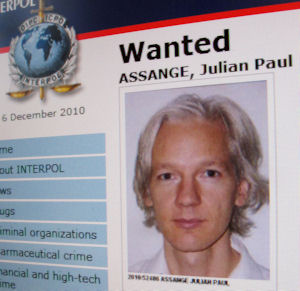UK extradition: a matter of trust?
While allegations against WikiLeaks founder Julian Assange and the husband of honeymoon murder bride Anni Dewani hit the headlines, Duncan Lamont looks at the process behind UK extradition.

Extradition procedures in the UK are very much in the news right now with Julian Assange, of WikiLeaks and the US secret documents, and Shrien Dewani, whose recent bride Anni Dewani was murdered in a township, face extradition to Sweden and South Africa respectively.
The law of extradition from England and Wales (Scotland has a separate legal system and slightly different procedures) was made less complex by the Extradition Act of 2003 which was a response to the raised terrorist threat in Europe. Extradition was made much easier.
EU member states created the European Arrest Warrant and the surrender procedures are relatively straightforward although one needs to get the paperwork correct. The state requesting extradition is generally represented here by the CPS (Crown Prosecution Service) and issuing states in “category one territories” (the EU member states) often approach the CPS prior to submission of the paperwork to seek advice on the content or format of the request and documentation supporting it.
Hearing
The extradition request is made to the Serious Organised Crime Agency which checks that the warrant has been issued by an appropriate judicial authority in the requesting territory. If the paperwork is OK the requested person, such as Julian Assange, is arrested (voluntarily or otherwise) and brought before a District Judge who must confirm, only on the balance of probability, his identity, ask if he consents to extradition and fix a date for the extradition hearing if he does not. The hearing should be within 21 days of the arrest.
Sweden is a category one country (easiest extradition) but South Africa is a category two territory, a little tougher but not much so.
There are some bars to extradition such as double jeopardy, age, how long ago the alleged offence took place etc. but also whether the person’s extradition would be compatible with his Human Rights Act 1998 Convention Rights. Any appeal against extradition must be lodged within seven days. The process can be surprisingly quick as Julian Assange is meant to be handed over within 10 days for the final court order.
Human rights
The European Arrest Warrant against Julian Assange relates to allegations of serious sexual assault in Sweden. As Assange’s lawyers will have told him the US has an extradition treaty with Sweden dating back to the 1960s. Sweden has a ban on extradition for “political offences” but Julian Assange’s lawyers are likely to be raising such points now in the UK rather than later.
They are likely to focus on his human right of freedom of expression (assuming all the Swedish paperwork is in order) as there is more than just a perception that certain states are out to get the WikiLeaks founder. In particular it is likely to be argued that Sweden issued the warrant for the purpose of prosecuting or punishing Mr Assange on account of his political opinions (s13 of the Extradition Act 2003). This has in the past stopped extraditions to Russia.
But the allegations concerning his sexual behaviour mean there are real (alleged) victims, two women, not some theoretical financial loss to a state.

Country category
Sweden is a category one country (easiest extradition) but South Africa is a category two territory, a little tougher but not much so!
This means there is a mutual extradition arrangement and the retention of the need for the South African authorities to provide more detailed information. Mr Dewani’s family have described the allegations he faces as “totally ludicrous” but taxi driver Zola Tongo told the High Court in South Africa – in a televised hearing – that he was offered about £1,400 by Shrien Dewani to help kill his wife.
The South African police service, based on that testimony, obtained a warrant for the arrest of Mr Dewani which was forwarded to the UK’s foreign assistance division which led to the arrest.
As a category two country the South Africans have prepared a preliminary case against Shrien Dewani (with more documentation from prosecutors to follow) and the extradition must be finally approved by the Home Secretary. Usually this takes longer than a category one extradition.
Extradition
The South Africans do not have to reveal all the evidence of alleged guilt. The Secretary of State can find that surrender is prohibited, for example if Mr Dewani could face the death penalty. The South Africans will have to provide an adequate written assurance that the death penalty will not be imposed. A “requested person” may appeal within 14 days to the High Court and once all the legal remedies have been exhausted should be extradited within 21 days.
Mr Assange and Mr Dewani protest their innocence but the likelihood of their being handed over to Sweden (or the US) and South Africa in due course is not materially different in most parts of the world now. Similar arrangements exist in India, Australia, North and most of South America and westernised Europe.
They might be considerably harder to extradite from Iran, China, Libya and Saudi Arabia if they had chosen to go there rather than here after their alleged crimes but there may be reasons why Julian Assange in particular might not want to find himself having to argue his right of free expression to betray and slag off the leaders of those countries…
Duncan Lamont is a partner at City law firm Charles Russell LLP.